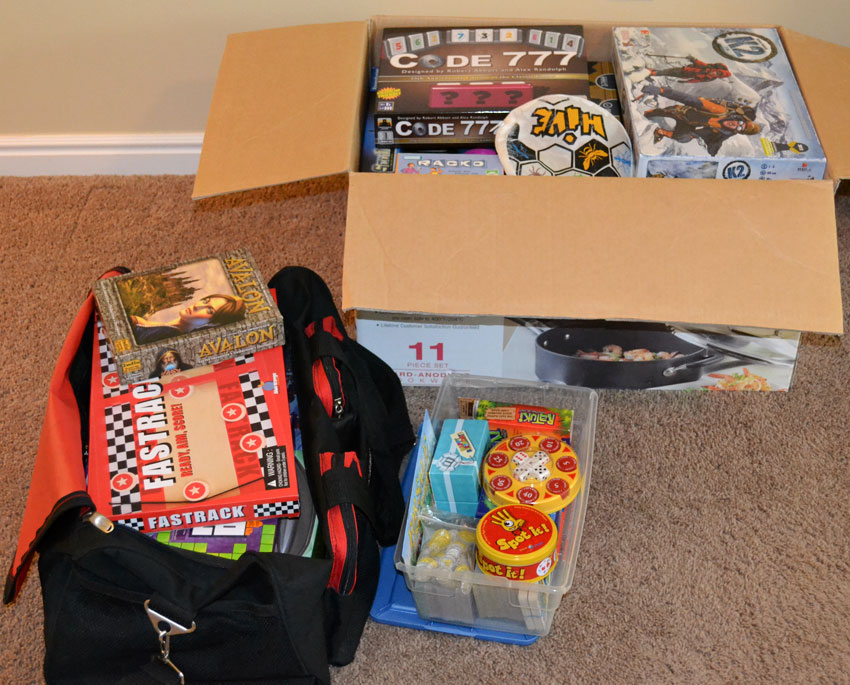Summer vacation time! 10 Days in the Americas
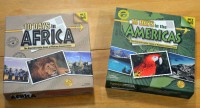
Summertime is the perfect time for family vacations.
Kids are out of school and ready to play.
And parents are ready to take a break from work and get away as well.
Vacations are also on our mind now because we just got back from a fantastic family trip.
It may come as a shocker but we didn’t even take or play a single game on this trip. (Also explains the almost 2 weeks without a post.)
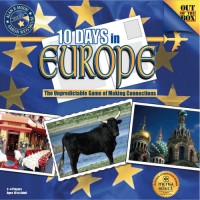
This trip was all about simply getting away from our normal routines.
It was great!
And with family trips on our mind, we’ve got a great family board game series suggestion for you – the “10 Days” series – by Out of the Box.
There are currently 5 games in the series:
The basic objective and game play is the same in all of the 10 Days games:
Chain together a 10-day journey across different parts of the world. The first player to complete their journey wins.
A 10-day journey is considered complete when; starting with Day 1, each day is connected to the next day in the tile holder.
We’ll dive into details of the most recent game in the series to give you a glimpse of how to play:
10 Days in the Americas
Place the reference map of the Americas on the table – with all the colorful countries – and begin.
To start, each player places a set of tile holders (displaying day numbers 1-10) in front of him or her. All the country and transportation tiles are placed facedown and players fill their tile holders without taking turns. To do so, players select a tile, look at it, and choose an open day to place it in their holder until all 10 days are filled.
After everyone is done placing their starting 10 tiles, the rest of the tiles are stacked facedown in a Draw pile. The top 3 are then turned over and each placed face-up to form 3 Discard piles.
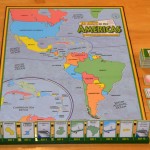
While the starting selection process may seem too easy to arrange the tiles, the catch is that once placed, a tile cannot be moved.
Pick a tile, place it, and hope that the next tile you draw will align with it. But chances are higher that it won’t. So you’ll guess where the second tile might fit best – anticipating good tile draws hereafter… After the 5th opening tile draw, your chain may already be so disjointed that you’ll wonder how you’ll ever make a continuous trip along the way.
And that’s when you’re glad that you’ll now get to switch out tiles.
Now it’s also time to take turns.
A turn consists of Drawing a Tile and Place a Tile.
Draw a Tile
The player selects the top tile from one of the 3 face-up discard piles or from the top of the draw pile.
Place a Tile
The player then can replace any one of the 10 tiles in his holder with the tile just drawn. If it replaces a tile in the holder, that removed tile is then placed on one of the 3 discard piles of his/her choice.
If the player draws a tile that they don’t want to fit anywhere in their holder, they can simply discard the drawn tile.
If at the end of a player’s turn, that player has a completed 10 journey in their holder, he or she wins.
To be considered a completed 10 day journey, each day must correctly connect to the next day.
So how are connections made?
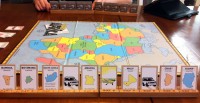
Glad you asked…
By Foot
Countries that border each other are connected by Foot travel. This means that a player can travel on foot from one country to a neighboring country. In the Americas version there are also ferry connections (broken black lines between two countries) that count as traveling by foot.
By Ship
Players can use a ship to travel through a body of water that borders the countries being connected. When a ship/body of water tile is positioned between two country tiles, those 3 tiles are connected to one another. For example a ship in the Caribbean Sea will connect Trinidad & Tobago with Belize.
Players can also “Take a Cruise” by using two or more ship tiles to travel from one country to another. Each of the ship tiles must be for a body of water that borders the country or body of water of the preceding tile. The cruise ends on a country tile that borders the body of water on the preceding ship tile.
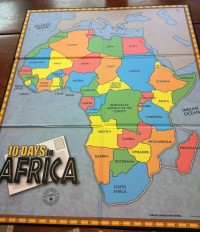
Players can use an airplane to fly from one country to another as long as they are of the same color. For example, one the map Peru and Honduras are blue countries. To fly from one to the other, a player will need a Blue Airplane tile in between them to make the connection.
And that’s all there is to it!
Can the whole family enjoy 10 Days in the Americas?
10 Days in the Americas a simple, fun family board game that also has a great learning element to it. It also has a good balance of light strategy and luck – which is key to a good family board game.
The box indicates ages 10 to Adult, but we’re glad to report that younger kids will also enjoy the game. The game board map makes it very easy to understand where connections can be made and kids love figuring out how to make connections.
And older folks can enjoy the game as well.
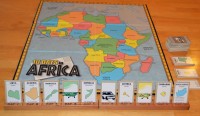
Other 10 Days board games
Like we mentioned, there are 4 other 10 Days games as well. We own the Americans and the Africa versions and enjoy them both.
While the basic game play is the same with each version, there are a few variations in the travel options in each of the games. For example, Africa and USA don’t have ships, but they do have automobiles that let you drive through a 3rd country connecting two others. And the Asia version introduces Trains into the mix.
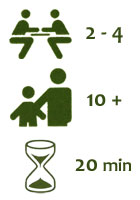 So which version should you pick?
So which version should you pick?
Well, that completely depends on what part of the world you’re most interested in. Some people may be interested in having them all, but we’d guess the vast majority will either pick the game that covers the part of the world they live in, or are most interested in visiting. (An African safari is definitely on my bucket list.)
Regardless of which version you pick, we think you’ll enjoy the time you spend with your family planning out 10-day trips around this grand world!


